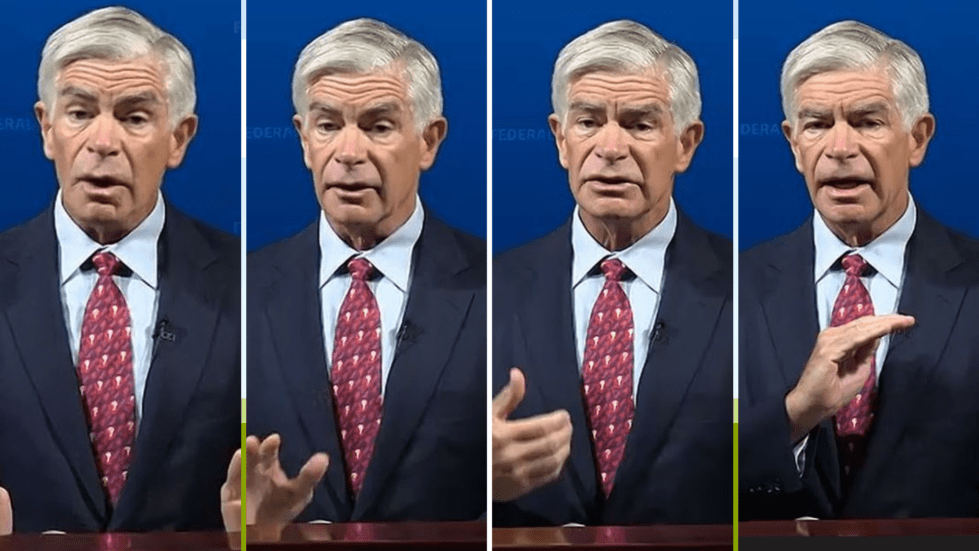

Patrick T. Harker, president of the Philadelphia Federal Reserve Bank, told the Delaware State Chamber of Commerce that the country needs to have more conversations about the federal debt.
Another rise in interest rates is not needed and the U.S. economy seems unlikely to tip into a recession, the president of the Philadelphia Federal Reserve Bank told the Delaware State Chamber of Commerce Friday.
Patrick T. Harker, a former president of the University of Delaware, also said wages are falling slightly and that he expects the unemployment rate to rise to 4.5% in 2024, but predicts there will be no mass layoffs.
“There are many factors that play into the calculation of the unemployment rate itself,” he said. “For instance, we’ve had recent months where even as the economy added more jobs, the unemployment rate increases, because more workers move off the sidelines and back into the labor force.”
Harker — who was wearing a Phillies tie to celebrate the Thursday night win putting them into the National League playoff – stressed during his annual appearance at the Chamber that his comments reflected his own opinions, not those of the Fed.
“Or as I’ve become fond of saying, when you’re telling your colleagues about this morning’s conversation, you can say ‘Pat said,’ not ‘The Fed,’ OK?” he joked.
Harker said he’s often asked about interest rates and inflation.
The Fed has raised interest rates 11 times in a row to try to slow down the economy’s inflation rate.
That more-than-5% hike has slowed home loans and hit banks’ bottom lines because of tighter credit.
He said he doesn’t expect another rate hike, but noted he said the same thing two months before the rates were raised the last time.
“I’m happy to say that so far economic and financial conditions are evolving, as I expected, if not perhaps even a tad better,” Harker said. “Disinflation is underway. Economic activity has been resilient. Labor markets are coming into better balance. Moreover, these conditions aren’t just where I see the national economy being but also our regional economy and specifically for today’s discussion, Delaware’s.”
The economy has continued to stabilize despite labor strikes, unexpected wars, a $33 trillion national debt and fears about the federal government shutting down, Harker said.
In August inflation was still elevated at 3.5% year over year, but was 3 points below what it had been a year before. Harker said he expects inflation to drop below 3% in 2024 and level out to the target rate of 2%.
The country’s Gross Domestic Product is outperforming estimates from earlier in the year, and he expects that to continue through 2023 before pulling back slightly in 2024, he said.
“This economy is proving to be nothing if not resilient,” Harker said.
It’s impossible to say now how long the Fed needs to keep interest rates up because more months of data are needed, he said.
“If inflation were to rebound, I know I would have no hesitancy to support further rate increases as our objective at the Fed is to return inflation to target and that is simply not negotiable,” he said. “I believe that a resolute patient stance of monetary policy will allow us to achieve the soft landing that I think we all wish for in our economy.”
Harker on Delaware
- The Philadelphia Fed’s region’s economy increased 3.3% year over year, as of August, and Delaware’s three-month increase of .06% matched the national rate.
- The state’s high propensity businesses, which are those likely to grow and add employees, is strong and has been growing since the start of COVID-19 pandemic.
- Worry over a decline in the number of rooms booked at Delaware beaches during the summer — compared to the highs of the pandemic — can reflect a lot of things, including inflation and the weather.
- The interest rates also hit the credit card market, a big Delaware industry. Harker said that year over year, the number of open bank cards is up more than 6% while at the same time, new card applications are down and outstanding balances are up 15%.
- Both credit card and mortgage delinquency rates are rising slightly, he said.
- Finding workers is still hard for many businesses. Employers are doing all they can to keep them, but three straight months of labor force and household job gains has brought the state’s unemployment rate closer to the national rate than at any point in the last two years.
- Major sectors including construction, finance and professional services are all above where they were in February 2020.
- The construction, finance and professional service sector employment rates are all above where they were in February 2020, and there’s been a nearly 9% year over year increase in leisure and hospitality sector jobs, which is back to around pre pandemic levels.
- The region has a healthy diversity of manufacturing jobs. In York, Pennsylvanioa, about 15% of the county’s workforce is in manufacturing, compared to the national average is around 9%.
Shrinking workforce
About 10,000 people become eligible for retirement each day and will through 2029, State Chamber President Mike Quaranta noted.
At the same time the number of high school students is expected to decline sharply, he said. Delaware has only 11,000 high school seniors this year, he said.
All of that points to a smaller workforce, he said and asked Harker what that meant for business.
“Economic growth is really a very simple equation,” Hare said. “Growth in terms of productivity, that is how much we’re getting, how much output we’re getting per worker, increasing that plus growth in the number of workers.”
MORE DELAWARE: Huge crowd turns out for ‘Stand with Israel’ rally
To grow, businesses have to increase the productivity of each worker, or increase the number of workers, he said.
Our current birth rate in the United States is not replacing us,” Harder said. “We need 2.1 roughly 2.1 births per family … to replace us. We’re not there, but it’s particularly acute in the Northeast and in the Midwest.
“So what do we do about that? We can either have more children or we bring more people into the country. And here I want to double down on my disclaimer that the Fed has no say an immigration policy and I’m not pretending to have any say in immigration policy.”
Companies are investing in technology, including artificial intelligence, Harker said, but he doesn’t believe A.I. will be able to replace a customer service job, but may be used to enhance it.
Many employers would be delighted to have a lot of the workers who reach retirement choose to continue working, he said, not only to keep workers in place, but also train younger workers for the future.
Downtown office space
Harker said cities across the country are seeing fewer people in office space.
While that affects the development of workers, the most worrisome thing about that is that it affects other downtown businesses as well as financial institutions who are heavily invested in commercial property, he said.
Some companies are starting to insist workers return to the office. Comcast in Philadelphia told its workers that after Labor Day, all employees would be required to work in the office for four days a week, he said.
“But it is a concern,” he said.
The Fed is worried about particular community banks who may have an outsize exposure to some commercial office space in terms of whether they have the proper risk management practices in place to manage those risks that are increasing, he said.
The $33 trillion debt
In what Harker stressed was a personal opinion, he said the country is not having the right conversations about the debt.
Modern monetary theory says that people should load up on debt because it helps spread the money around.
“Not any more,” he said. “If you look at the federal budget, there’s a significant increase in debt service costs, because rates have gone up, so that is putting real pressure on the budget.”
The tipping point may not be right around the corner, but it’s not far off, he said.
“It’s not your next generation problem. It’s our problem. And we need to deal with it,” he sauid.
The country needs to understand what the debt is and how much the country pays for that, defense and entitlement programs, he said.
“Those three comprise 70-plus percent, almost 80% of the U.S. budget,” he said. “We talk a lot about the other 20%. But the reality is, unless you deal with entitlements, defense and interest on the debt, which is borrowing less over time .. you can’t get this under control. That’s where the conversation has to go.”


Betsy Price is a Wilmington freelance writer who has 40 years of experience.
Share this Post








